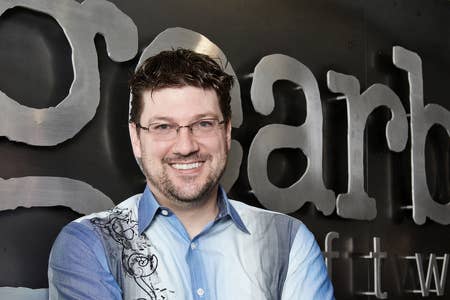Nordic Game: Randy Pitchford on the hidden value of licensed IP
Gearbox Software's CEO outlines the numerous benefits of skillful work with licenses, and its role in the company's rise to prominence
In the opening keynote of the Nordic Game Conference 2012, Gearbox Software's founder and CEO, Randy Pitchford, praised the opportunities that licensed games can offer to emerging studios.
Pitchford outlined the driving goal for Gearbox was to build an independent company that would have equal credibility as a source of new IP and a strong option for projects based on licenses, and through its Brothers in Arms and Borderlands franchises, Pitchford believes that Gearbox is perhaps the best example of that approach in the industry.
However, he seemed intent on addressing the tacit bias that many developers have against working with licenses, and outlined the many advantages and creative opportunities inherited IP can offer.
"There's lots of cool stuff out in the world. Before we begin our own journeys it's usually other people's work that inspires us. Right now, my studio is working on a game called Aliens: Colonial Marines... I've been stealing from Aliens my entire career."
"Doing the same thing over and over again, you will eventually die in this industry, either because of the technology you've mastered becoming outmoded, or because you become bored"
"We wanted to be sure that our image afforded us credibility and proof of experience...so if there was a dream project out there, if someone else had an IP, they would be lucky, they would be fortunate to have Gearbox involved."
The studio's first games were expansions for Half-Life and then Counter Strike, at a time when the company was far from the 200-strong powerhouse it is today. Indeed, when Gearbox started work on its first game, Half-Life: Opposing Force, in 1999 it had just five employees, but what could have been routine work became something far more significant.
"When Valve launched Half-Life in 1998 it was an incredible game, a groundbreaking game, revolutionary in some respects, but it was a game... It would be 5 or 6 years before Valve released a sequel. So not only did we have fun playing in their brilliant space, but we helped Valve turn their game into a franchise."
From the very beginning, Pitchford and the founding Gearbox team believed that creative satisfaction would only come in balance with commercial success, and the knowledge that its products held "relevance" for both their peers and the public.
"Without relevancy you have no hope of earning credibility," he said. "You might make something amazing, but without relevancy they won't even know you exist.
New IP can be relevant, but for young studios - particularly those with a desire to break into AAA development and collaborate with major international publishers - developing genuine skill with licenses is invaluable, and far more difficult than many assume.
"We had to bring something to the table. It wasn't enough just to do the job; we had to make it special, make it our own. When you played Opposing Force we wanted it to feel like the people that made it actually cared... You have to find a way to make it feel like not just anyone could have done it."
Licenses can also afford opportunities to try new disciplines and technologies, and gain broader experience quickly. Developing new IP is expensive, time-consuming and risky, and many studios mitigate those difficulties by sticking to what they know.
However, with technology moving so quickly and the industry in a constant state of flux, Pitchford regards new experience as essential to prosperity.
"Doing the same thing over and over again, you will eventually die in this industry, either because of the technology you've mastered becoming outmoded, or you'll die because the subjective elements - the feelings you're offering - you become bored with them."
Of course, not all licenses turn out as planned. The company's decision to purchase and complete Duke Nukem Forever was greeted by tepid sales and excoriating reviews. Even so, Pitchford still took some positive value from the experience.
"I'm really proud of that," he said with a knowing smile. "I think we have the best producers in the world, because we shipped Duke Nukem Forever."

